 Cover | |
| Genre | Role-playing games |
|---|---|
| Publisher | TSR |
Publication date | 1996 |
Netheril: Empire of Magic is an accessory for the 2nd edition of the Advanced Dungeons & Dragons fantasy role-playing game, published in 1996.
 Cover | |
| Genre | Role-playing games |
|---|---|
| Publisher | TSR |
Publication date | 1996 |
Netheril: Empire of Magic is an accessory for the 2nd edition of the Advanced Dungeons & Dragons fantasy role-playing game, published in 1996.
Netheril: Empire of Magic is a boxed set expansion to the Forgotten Realms setting which describes the long-lost ancient kingdom of Netheril, formed about 5,000 years ago, which excelled in usage of magic to the point of even stealing power from the gods before the kingdom fell. Player characters can travel back through time to ancient Netheril, or players can create characters native to the Netherese time period. [1]
Netheril: Empire of Magic was published by TSR, Inc. in 1996 as a boxed set.
David Comford reviewed Netheril: Empire of Magic for Arcane magazine, rating it an 8 out of 10 overall. [1] Regarding characters traveling back in time to Netheril or creating characters from that time period, he felt that "either choice has excellent adventure possibilities". [1] He commented that "The complexities of time travel and the ramifications of changing past events to effect the future has been clearly thought out, and is neatly side-stepped by only allowing travel to and from Netheril in one fashion. Spells from the Chronomancer supplement cannot access this area of time, the only means to travel is through the Time Conduit Spell created by Mystra, which only allows players to be in the past for one year. In addition anything the characters hold which is not available in the past simply vanishes to be returned when they journey home - equipment, memorised spells and most importantly spell use for priests. The pantheon of Netheril holds only ten deities, creating a major problem for the faithful who find their god absent. Likewise items from the past cannot be brought back to the present. Knowledge, however, can come home, and with 41st level arcanists wandering the land this could prove to be very precious." [1] Comford added: "The opportunity to create Netherese characters has been well structured too, with revised details on classes (none of the optional character kits from the complete books are accessible, among other changes), religion and equipment to reflect the differences in periods." [1] He continued: "The most drastic change, though, is to spellcasting. Spellcasters are arcanists and do not memorise spells - they merely pluck them out of the weave. On reaching 20th level he/she can progress to learn 10th, 11th and 12th level spells. Perhaps the greatest change, though, is that there are no damage limits for spells." [1] Comford concluded his review by saying "An Encyclopaedia Arcana supplement is included giving information on major magical items and spells. Everything needed to play in Netheril can be found within this box-set including two lavishly-drawn maps depicting Netheril both at its height and fall. Netheril is a great campaign expansion. Okay, so players might be put off a little at not being able to bring any mementos back from their travels, but with a little thought the adventure possibilities present can overcome this. If you're after new campaign ideas then this is highly recommended." [1]
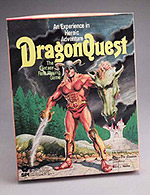
DragonQuest is a fantasy role-playing game originally published by Simulations Publications (SPI) in 1980. Where first generation fantasy role-playing games such as Dungeons & Dragons (D&D) restricted players to particular character classes, DragonQuest was one of the first games to utilize a system that emphasized skills, allowing more individual customization and a wider range of options.
The magic in Dungeons & Dragons consists of the spells and magic systems used in the settings of the role-playing game Dungeons & Dragons (D&D). D&D defined the genre of fantasy role-playing games, and remains the most popular table-top version. Many of the original concepts have become widely used in the role-playing community across many different fictional worlds, as well as across all manner of popular media including books, board games, video games, and films.

Dragonlance Adventures is a 128-page hardcover book for the Dragonlance campaign setting for the first edition of the Advanced Dungeons & Dragons fantasy role-playing game.

Greyhawk Adventures is an accessory for the Advanced Dungeons & Dragons (AD&D) World of Greyhawk campaign setting.
A character class is a fundamental part of the identity and nature of characters in the Dungeons & Dragons role-playing game. A character's capabilities, strengths, and weaknesses are largely defined by their class; choosing a class is one of the first steps a player takes to create a Dungeons & Dragons player character. A character's class affects a character's available skills and abilities. A well-rounded party of characters requires a variety of abilities offered by the classes found within the game.
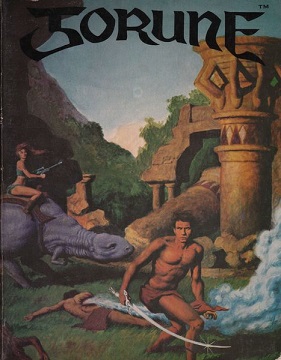
Skyrealms of Jorune is a science-fantasy role-playing game that was first published in 1984 through SkyRealms Publishing. The game is set on the fictional alien planet of Jorune above which float levitating islands. The second edition was published in 1986 as a boxed set, and a third edition was published by Chessex in 1992. The computer game Alien Logic: A Skyrealms of Jorune Adventure was published in 1994. The various editions received positive reviews in game periodicals including Casus Belli, White Dwarf, White Wolf, Different Worlds, Dragon, Polyhedron, The Games Machine, and Challenge.
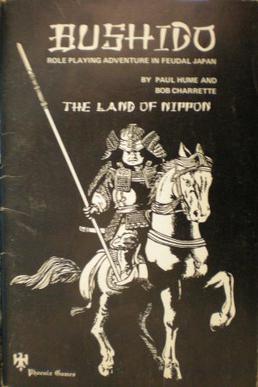
Bushido is a Samurai role-playing game set in Feudal Japan, originally designed by Robert N. Charrette and Paul R. Hume and published originally by Tyr Games, then Phoenix Games, and subsequently by Fantasy Games Unlimited. The setting for the game is a land called Nippon, and characters adventure in this heroic, mythic, and fantastic analogue of Japan's past.

Dungeon Master Option: High-Level Campaigns is a supplemental sourcebook to the core rules of the 2nd edition Advanced Dungeons & Dragons (AD&D) fantasy role-playing game.

Wizards and Rogues of the Realms is an accessory for the 2nd edition of the Advanced Dungeons & Dragons fantasy role-playing game, published in 1995.

The Book of Magecraft is an accessory for the 2nd edition of the Advanced Dungeons & Dragons fantasy role-playing game, published in 1996.

Player's Option: Spells & Magic is an accessory for the 2nd edition of the Advanced Dungeons & Dragons fantasy role-playing game, published in 1996.
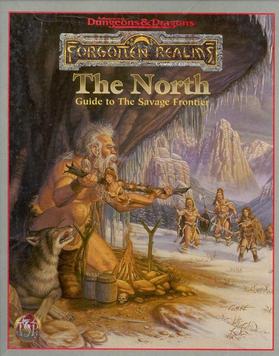
The North: Guide to the Savage Frontier is an accessory for the 2nd edition of the Advanced Dungeons & Dragons fantasy role-playing game, published in 1996.

Mind Lords of the Last Sea is an accessory for the 2nd edition of the Advanced Dungeons & Dragons fantasy role-playing game, published in 1996.

Psionic Artifacts of Athas is an accessory for the 2nd edition of the Advanced Dungeons & Dragons fantasy role-playing game, published in 1996.

Defilers and Preservers: The Wizards of Athas is an accessory for the 2nd edition of the Advanced Dungeons & Dragons fantasy role-playing game.
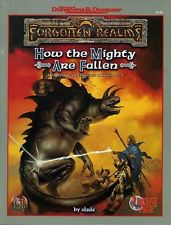
How the Mighty Are Fallen is an adventure module for the 2nd edition of the Advanced Dungeons & Dragons fantasy role-playing game, published in 1996.

World Builder's Guidebook is an accessory for the 2nd edition of the Advanced Dungeons & Dragons fantasy role-playing game, published in 1996.
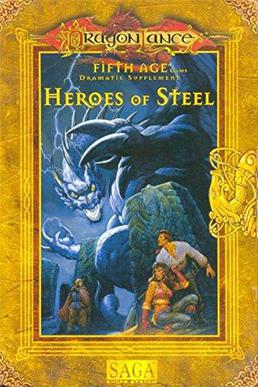
Heroes of Steel is a supplement to the 2nd edition of the Advanced Dungeons & Dragons fantasy role-playing game.
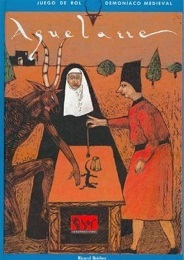
Aquelarre is a medieval demoniacal fantasy role-playing game created by Ricard Ibáñez and released by Barcelona publisher Joc Internacional in 1990. It was the first role-playing game completely conceived and created in Spain.

The Book of Sigils is a supplement published by R. Talsorian Games in 1995 for the Victorian steampunk role-playing game Castle Falkenstein.